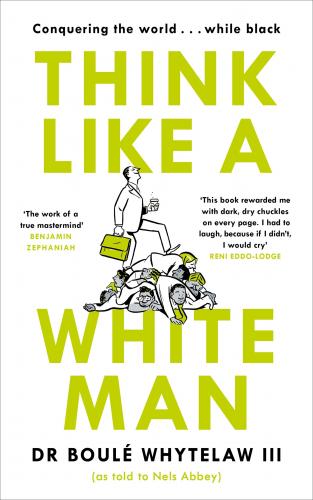First published in Great Britain, the USA and Canada in 2019
by Canongate Books Ltd, 14 High Street, Edinburgh EH1 1TE
Distributed in the USA by Publishers Group West and in
Canada by Publishers Group Canada
This digital edition first published in 2019 by Canongate Books
Copyright © Nelson Abbey, 2019
Quotation from speech by Lucius Cary, 15th Viscount Falkland in
The Official Record of the Debate Initiated by Lord Gifford QC in
the House of Lords of the British Parliament on 14th March 1996
Concerning the African Reparations, col. 1052.
Extract from The Huey P. Newton Reader © Huey Newton, 2002. Reprinted with permission of Seven Stories Press.
The moral right of the author has been asserted
British Library Cataloguing-in-Publication Data A catalogue record for this book is available on request from the British Library
ISBN 978 1 78689 434 2
eISBN 978 1 78689 439 7
About the Authors
Dr Boulé Whytelaw III
Dr Boulé Whytelaw III is the Distinguished Professor of White People Studies at Bishop Lamonthood University, the Deputy Vice Chair of the C(T)UWP, the Centre for (Trying to) Understand White People, and is widely acknowledged as the definitive global authority on white people.
He is the highly accomplished television-writing brain behind the hit shows Good Cops, Good White Folk and Other Wild Fantasies and Scientific Proof: The White Man’s Ice Is Indeed Colder.
Prior to an unfortunate redundancy he was a decorated banker (specialising in no-income, no-job or assets loans) and a grandee of a slew of corporate diversity schemes.
Nels Abbey
Nels Abbey is a British Nigerian (Itsekiri) writer and media executive based in London. This is his first book.
I dedicate this book to the most precious group of beings on the face of the Earth, as well as the foremost resistors of White-Manism: black women. Sistas, you’re loved, admired and worshipped by me. Forever and a day.
You’re deeply appreciated.
I also dedicate this book to my amazing white wife.
– Dr Boulé Whytelaw III
Contents
PART 1: UNDERSTANDING THE WHITE MAN
3 Performance + Politics = Power
4 Compassion or Progression? Decision Time
6 See No Racism, Hear No Racism, Speak No Racism
PART 2: OVERTHROWING THE WHITE MAN
10 It’s Not Just What You Do, It’s Who You Do It in Front Of
11 Network (i.e. Gossip and Make Fake Friends)
15 Power: How to Use, Abuse and Retain It
16 Your Power Base and Your Legacy
Appendix 1: Risk Assessment: Types of Black People in the Corporate World
Appendix 2: White Man Decoded: The Black Professional’s Dictionary
Introduction
Nels Abbey
Dr Boulé (pronounced boo-lay) Fabricius Whytelaw III was born Blakamoor-Tajudeeni Mamasay-Mamakusa somewhere in the early 70s (by my estimations). In order to achieve what he called ‘white success’ he changed his name to sound as white as possible (not dissimilar – as he would inform me – to Charlie Sheen, Ralph Lauren and Whoopi Goldberg).1
After this slight relabelling, he started getting job interviews and eventually an offer that was unthinkable to a black person called ‘Blakamoor-Tajudeeni’ (this was long before brands like ‘Barack Obama’ and ‘Lupita Nyong’o’ successfully emerged). This experience made him realise that making himself as palatable to white people as possible would help propel him to ‘white success’. He felt the need to go further. Much further.
He began to study Caucasians, in his words, ‘from Austria to Australia, London to Los Angeles, Cape Town to the Caucasus Mountains, Whitehall to the White House and everywhere white in-between’. He earned a PhD in White People Studies (the first and only human I am aware of to do so) and emerged as the foremost expert on ‘the world’s toughest subject: white people’.
Clearly
